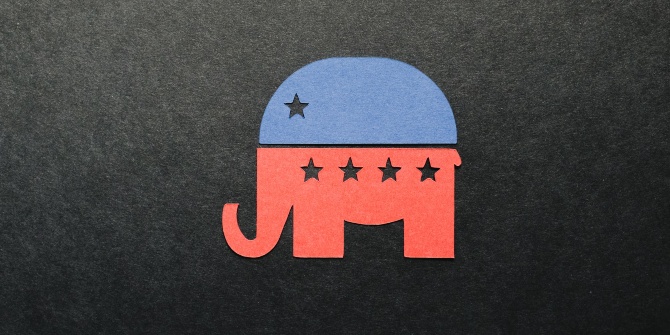 There have been over 1,500 executions in the United States since the death penalty was reinstated in 1976. In new research Frank R. Baumgartner examines what drives support for the death penalty in the US. Using a database which measures conservatism, liberalism, and racial resentment in each state, he finds that those states with higher levels of racial resentment were more likely to impose death sentences. Troublingly, many people support the death penalty because of its racially distinct impacts.
There have been over 1,500 executions in the United States since the death penalty was reinstated in 1976. In new research Frank R. Baumgartner examines what drives support for the death penalty in the US. Using a database which measures conservatism, liberalism, and racial resentment in each state, he finds that those states with higher levels of racial resentment were more likely to impose death sentences. Troublingly, many people support the death penalty because of its racially distinct impacts.
Scholars of public opinion have long understood that punitive attitudes in general, and support for the death penalty in particular, can be predicted by certain people’s attributes. These include such things as low education, being male, being in the US South, certain religious affiliations (but not others), and general political conservatism. Republicans are more likely to support the death penalty, as many of the same social identity and attitudinal factors that predict affiliation with the more conservative political party also predict support for punitive criminal justice policies. And in recent years, a partisan divide has been clear with President Donald Trump overseeing an unprecedented number of executions in his last six months in office, and President Biden declaring a moratorium on federal executions shortly after coming into office.
Support for the death penalty is often based on race
But the politics of the death penalty in the US is not just about partisanship. It’s about race. More specifically, it’s about white racial hostility to Black people. This should not be a surprise, as racial disparities in the use of the death penalty have been solidly documented, as in mass incarceration more generally. For people who are highly concerned about these racial factors, these are reasons to oppose mass incarceration, the death penalty, and highly punitive criminal justice policies. But there is another side to the story as well, a less appealing one: Some people support these policies precisely because of their racially distinct impacts.
Criminologists Francis Cullen and James Unnever have conducted much of the most influential research in this area, and they conclude one of their studies in this manner:
research clearly documents that public opinion about crime and its control is driven by racial animus. Thus, when politicians justify their support for getting tough on criminals by citing public-opinion polls, they are either explicitly or implicitly basing their policy decisions on racialized punitive attitudes. In short, the data show that when it comes to public opinion about crime and its control, race and racism matter.

“003 Brandon Bernard Vigil” (CC BY 2.0) by Felton Davis
Investigating racial resentment and the death penalty
With colleagues Scott Duxbury and Christian Caron, I recently added some troubling evidence to this ugly but consistent set of research results. Our work assesses the number of death sentences handed down in each state with a legally valid death penalty statute during the period of 1989 through 2017. This is the period for which we can use a state-level measure of political ideology developed by William Berry and colleagues and updated by Richard Fording. For each state, and for each year, this tells us the degree of political conservatism or liberalism. (Connecticut, Delaware, New York, and Oregon are often at one end of the scale whereas Kentucky, Oklahoma, and Indiana are regularly at the opposite end.) Crucially, we are able to add to this a similar state-year measure of racial resentment brought to the literature by the work of Candis Watts Smith, Rebecca Kreitzer, and Felya Suo. This database generates an estimate of the aggregate level of racial resentment in each state in each year during the same period, distinct from simple ideology. (This scale puts Oregon, Utah, Washington, New Hampshire at one end of the scale with Arkansas, Tennessee, Louisiana, and Alabama regularly at the other)
With these two data resources made available through the community of scholars interested in measuring public opinion across time and space, we were then able to specify this model:
Figure 1 – Model of death sentencing at the US state level

Here, we posited that historical factors associated with race relations, including demographics and the history of lynchings, affect current levels of racial resentment. Then, resentment, ideology, and a set of standard control variables (including political factors such as what party controls the government as well as crime-related variables of course) predict the number of death sentences.
The contemporary relevance of a history of lynchings
Our results spoke powerfully in favor of the argument we made. The historical tradition of better or worse relations between the Black and white communities within a state are reflected in today’s politics by higher or lower levels of racial resentment, and this variable is statistically distinguishable from simple conservative v. liberal ideology in general. These factors then independently affect a state’s tendency to impose death sentences in a model that simultaneously controls for the number of homicides. Further, using mediation models, we can show the continued contemporary relevance of the historical legacy of lynchings.
Our findings showed strong effects, not just marginal ones. Further, by linking actual usage of the death penalty to these ideological and racial attitudes, we show that this is not merely an academic question: these are actual state actions with the highest consequence. The death penalty has been considered to be a reflection of a vigilante tradition, and its links to the history of lynching have previously been explored by many scholars. Similarly, the individual level connections between support for the death penalty and racially resentful attitudes have also been amply documented. By bringing these literatures together, our study challenges any understanding of the death penalty suggesting that it is a reasonable response to unacceptable levels of crime. While it may be acceptable to some as a theoretical matter, the application of the death penalty throughout modern times in the US has been inextricably linked to race, racial fear, and racial animus. It is indeed the modern form of lynching, and it reflects the same underlying racial attitudes as were so expressed in times gone by.
- This article is based on the paper, ‘Racial Resentment and the Death Penalty’ in the Journal of Race, Ethnicity, and Politics.
- Please read our comments policy before commenting.
- Note: This article gives the views of the author, and not the position of USAPP – American Politics and Policy, nor the London School of Economics.
- Shortened URL for this post: https://bit.ly/46fHERA






